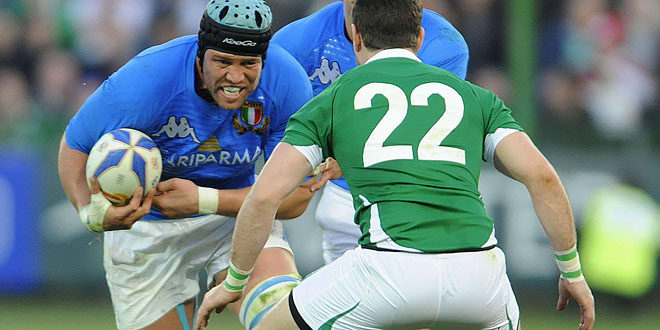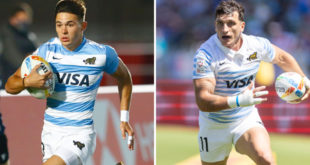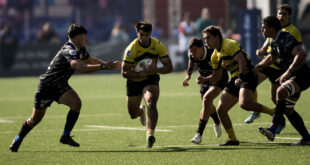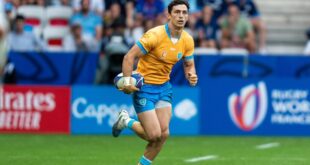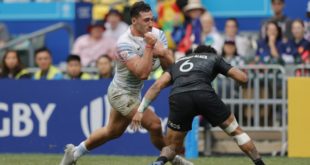Urgent matters over rugby player eligibility have surfaced for the third time in a handful of days. The three players all played for Italy and enjoyed long careers. The three men also all played at Rugby World Cups.
Player eligibility is defined in Regulation 8 by World Rugby. It can be achieved in one of four ways: (a) country of birth; (b) country where one parent or grandparent was born; or (c) complete 5 years of consecutive residency immediately before representative duty; or (d) complete ten years of cumulative residence preceding the time of playing.
Regulation 8 for residency has been extended from three to five years since Rugby World Cup 2019. That World Cup was the second to involve Russia who took Romania’s spot after Sione Faka’osilea was confirmed as having already been captured by Tonga. In addition, Spanish players Mathieu Bélie and Bastien Fuster were deemed to be captured by France by u20’s. The punishment for both Romania and Spain was disqualification.
Players can no longer be captured via the means which saw Spain disqualified. That is to say that countries can no longer nominate their u20 side as their ‘next senior XV’.
Bélie returned to help Spain qualify for RWC 2023, Los Leones’ first Rugby World Cup since 1999. Spain had their qualifying points removed by World Rugby after Gavin van den Berg was deemed not eligible. The South African had been a replacement in 43-0 and 52-7 wins against the Netherlands. Every other competing team also gained bonus point wins over the Netherlands.
Spain appealed the decision but it was upheld; World Rugby replaced Spain with Romania at RWC 2023. The disqualification was not consistent with the outcome for Wales and Scotland who fielded players that were not eligible at previous Rugby World Cups.
A scandal in March 2000 revealed that fullback Shane Howarth and flanker Brett Sinkinson were not eligible for Wales. Their eligibility was via grandparents who were not from Wales. Howarth and Sinkinson played against Argentina, Australia, Japan, and Samoa.
Dave Hilton was found not eligible for Scotland. Investigations confirmed that the prop qualified via a grandfather who was from England not Scotland. Hilton played for Scotland against South Africa, Spain and Uruguay in 1999 and also played at RWC 1995.
The International Rugby Board (IRB – now World Rugby) acted by preventing Howarth from playing again for Wales. Sinkinson and Hilton returned via three-years residency to play again in 2002. Neither Wales nor Scotland were disqualified from RWC 2003; in fact, both competed without needed to qualify. This was inconsistent to the fate of Romania regarding RWC 2019 and Spain regarding RWCs 2019 and 2023.
RWC 2003 was the first of four World Cups involving Martín Castrogiovanni. He played for Italy against Canada, New Zealand, Tonga and Wales at RWC 2003. He faced New Zealand, Portugal, Romania and Scotland at RWC 2007. He played in four matches in RWC 2011, taking-on Australia, Ireland, Russia, and the USA. At RWC 2015 he played against Canada and France.
Castrogiovanni was joined by Luciano Orquera at RWC 2011. Orquera played against Australia, Ireland and the USA at RWC 2011. Both qualified via ancestry; however, they were not eligible. Martín Castrogiovanni admits that he is Italian via his great-grandfather while Luciano Orquera says that his family links to Italy are Italian great-grandparents on the mother’s side of his family.
What this means is that Castrogiovanni and Orquera were not eligible to play for Italy via ancestry. As noted, eligibility laws do not permit a player to qualify via a great-grandparent.
Castrogiovanni moved to Italy in 2001 and debuted in 2002. Orquera moved to Italy in 2002 and also earned his first cap before completing three years residency. In other words, neither player was eligible to play for Italy when they debuted.
Both Castrogiovanni and Orquera were naturalized; notwithstanding, World Rugby eligibility laws do not consider citizenship nor passports in determining eligibility. Holding an Italian passport or citizenship is irrelevant to a player’s eligibility as outlined in Regulation 8 by World Rugby.
Castrogiovanni went on to play 119 test matches for Italy. Orquera played 48. An arguement could be made that Castrogiovanni qualified by residency as of 2004 as he played for Calvisano from late 2001-2006. Was he in Italy for sufficient time per year?
Orquera was Italian-based from 2002-2005 before moving to France. Was he in Italy long enough each year? Or was it only from 2012-2015 when he played three seasons for Zebre that he truly spent consecutive residency-qualifying years in Italy?
If it could be proven that Castrogiovanni’s time at Calvisano counts, similar to Sinkinson’s in Wales, then that would make him eligible for Italy at RWCs 2007, 2011 and 2015. He remains not eligible at RWC 2003. This is a minefield for World Rugby as he played for Italy vs Romania in 2002 in a Rugby World Cup 2003 qualifying match. World Rugby disqualified Russia after learning that players qualifying via grandparents did not actually have Russian grandparents.
If Orquera only qualified via residency in 2015 then he was not eligible at RWC 2011. This, however may not matter whatsoever as a third Italian Rugby World Cup player has surfaced as not having been eligible at that same tournament.
Carlo del Fava qualified for Italy via ancestry. Publications have said he qualified via an Italian father. However, in 2008 del Fava explained that his Italian family is through his great-grandfather.
“My great-grandfather arrived in South Africa from Lucca. In the end he stayed here, started a family. My grandfather, my father, me were born here: a lot of years have passed but at home the feeling of being Italian has never failed.”
The above quote means that the player was not eligible to play for Italy via ancestry. Alarmingly for Italy and World Rugby the article appears on the Six Nations website.
Carlo del Fava moved from South Africa to Italy in 2004 and debuted that same year for Italy. He played in France and Ireland from 2005-2009 before joining Viadana in 2009 and Aironi in 2010.
His test career was from 2004-2011. He played for Italy against Portugal and Scotland at RWC 2007 and against Australia at RWC 2011. Italy qualified for RWC 2007 by beating Portugal and Russia. del Fava played in the win against Portugal.
Russia’s disqualification from the RWC 2003 qualifiers suggests that Italy should have been disqualified from RWC 2007. Furthermore, it suggests that Portugal should have qualified in place of Italy and that Russia should have faced Uruguay in repechage with the winner qualifying.
Russia’s disqualification from RWC 2003, Romania’s disqualification from RWC 2019 and Spain’s from RWC 2019 and 2023 matter significantly. What then ought to happen to Italy for fielding players that were not eligible at past Rugby World Cups? Consistency is required. The loosening of eligibility laws should be reversed with eligibility made tougher not easier.
Disqualifying Italy would be upholding eligibility laws. On the one hand, being a naturalized citizen does not count. On the other hand, residency does count; players do not require national documents. Rugby deserves better than this. Players should be legal members of the country they represent. They should have official documents and they should have no prior representative honors at adult level for another country.
 Americas Rugby News Rugby news from across the Americas!
Americas Rugby News Rugby news from across the Americas!
